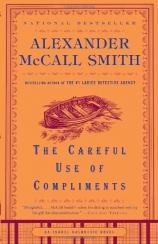Reading Group Guide
Discussion Questions
The Careful Use of Compliments: An Isabel Dalhousie Novel

1. The novel opens with Isabel and Jamie discussing a philosophical question: out of one hundred people, how many mean well [p. 3]? Isabel is more optimistic about human nature than Jamie is. Is there a character in this story who does not mean well? Whose view of the relative goodness of human nature is more correct—Jamie’s or Isabel’s?
2. Now that Isabel’s status has changed from that of solitary spinster to that of single mother, she “feels more sensitive to the presence of Grace in the household. In what ways does Grace’s position in Isabel’s life become more complicated now that she helps out with Charlie, and now that Jamie often stays the night?
3. Just after Jamie’s proposal of marriage [pp. 27–28], Isabel thinks to herself that the burden of the philosopher was that “one knew what one had to do, but it was so often the opposite of what one really wanted to do” [p. 29]. What she has done is suggested to Jamie that it’s better to wait. Why, if this is not what she wants, does she suggest it?
Is she being overly cautious, and if so, why?
4. At the auction gallery, Jamie asks Isabel, “Just how well-off are you?” She tells him quietly that she has “eleven million pounds. . . . Depending on the value of the dollar” [pp. 62–63]. How might this admission change Jamie’s feelings about his relationship to Isabel and Charlie? Is he right to ask, and is she right to tell him? Why is her money such a sensitive issue?
5. When in a state of mental conflict, Isabel thinks of Plato’s Phaedrus: “There were two horses in the soul . . . the one, unruly, governed by passions, pulling in the direction of self-indulgence; the other, restrained, dutiful, governed by a sense of shame” [p. 33]. Does it seem true that a person must often choose between these two impulses? Does Isabel’s struggle between the two make the decisions we make in everyday life seem more consequential, more ethical?
6. A brief conversation with Grace indicates how Isabel worries about her future with Charlie. Grace says, “All boys like their mothers,” to which Isabel answers, “Some mothers suffocate their sons, emotionally” [p. 32]. Isabel’s thoughts about Charlie’s future are affected by her visit to the wife and child of the painter Andrew McInnes [pp. 150-53], and by her visit to Walter Buie and his mother [pp. 220-28]. What kind of a mother is Isabel likely to be, even if she has to raise Charlie by herself?
7. Thinking about fictional characters like Madame Bovary and Anna Karenina, Isabel thinks to herself, “She had no author, though. Isabel was real” [p. 131]. Smith has a bit of fun here with the effect of reality he is creating in his fiction; in fact he uses actual Edinburgh streets and auction galleries, actual Scottish painters, and so on, in his stories. What aspects of the Isabel Dalhousie novels make them seem particularly “real”?
8. Isabel is a person who strives to be perfect in her ethical conduct. Despite the power her inherited wealth might give her, “she would not depart from the code she had set for herself. It was hard, very hard sometimes . . . [p. 55]. Given that she resolves the problem of her position at the Review of Applied Ethics by buying the journal, does she meet her own standard in this regard? In doing so, she maintains control of the journal and her own independence.
Is it the perfect solution?
9. Cat’s jealousy is a serious problem for Isabel. Why is Cat jealous? Is it likely that she really wants Jamie back? Is Cat, as Isabel worries, “fast,”or merely “confused” [pp. 145–46]? Does it seem possible that Jamie would be vulnerable to loving Cat again [p. 86]?
*Spoiler Alert: Do not read past this point unless you want to find out about the mystery.
10. When she finally meets Andrew McInnes, Isabel tells him of her visit to his wife and son [pp. 150–53]. McInnes believes that the child was fathered by his wife’s ex-lover, but Isabel assures him that the boy looks just like him [p. 241]. Does Isabel do right in speaking to him about such an intimate matter, and to suggest that he has a duty to go and see his wife and son? What motivates her to do so?
11. When she learns from the intimidating Mrs. Buie that Andrew McInnes is still living, Isabel says, “Disappearing in the first place was rather foolish” [p. 228]. McInnes’s supposed suicide and reappearance under a false identity do seem like very odd behavior. Is it likely that a person would do such a thing? What does he gain by it; what does he lose?
12. The uncertainty of Isabel and Jamie’s love affair is a source of tension throughout the novel. Isabel, so direct about most things, thinks often about her love for Jamie but doesn’t speak these thoughts to him [pp. 83, 158]. What does the final scene, with Isabel’s murmured rhyme about the tattoed man [p. 247], suggest about possible further
developments?








